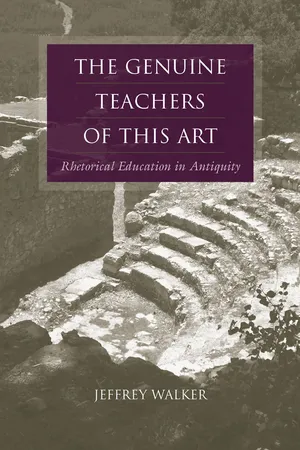
- 368 pages
- English
- ePUB (mobile friendly)
- Available on iOS & Android
About This Book
Genuine Teachers of This Art examines the technê, or "handbook, " tradition—which it controversially suggests began with Isocrates—as the central tradition in ancient rhetoric and a potential model for contemporary rhetoric. From this innovative perspective, Jeffrey Walker offers reconsiderations of rhetorical theories and schoolroom practices from early to late antiquity as the true aim of the philosophical rhetoric of Isocrates and as the distinctive expression of what Cicero called "the genuine teachers of this art."
Walker makes a case for considering rhetoric not as an Aristotelian critical-theoretical discipline, but as an Isocratean pedagogical discipline in which the art of rhetoric is neither an art of producing critical theory nor even an art of producing speeches and texts, but an art of producing speakers and writers. He grounds his study in pedagogical theses mined from revealing against-the-grain readings of Cicero, Isocrates, and Dionysius of Halicarnassus. Walker also locates supporting examples from a host of other sources, including Aelius Theon, Aphthonius, the Rhetoric to Alexander, the Rhetoric to Herennius, Quintilian, Hermogenes, Hermagoras, Lucian, Libanius, Apsines, the Anonymous Seguerianus, and fragments of ancient student writing preserved in papyri. Walker's epilogue considers the relevance of the ancient technê tradition for the modern discipline of rhetoric, arguing that rhetoric is defined foremost by its pedagogical enterprise.
Frequently asked questions
Information
INDEX
Table of contents
- Cover Page
- Title Page
- Copyright Page
- Dedication Page
- Contents
- Series Editor's Preface
- Acknowledgments
- Prologue: Rhetoric and/as Rhetorical Pedagogy
- One | Cicero's Antonius
- Two | On the Technê of Isocrates (I)
- Three | On the Technê of Isocrates (II)
- Four | In the Garden of Talking: Birds Declamation and Civic Theater
- Five | Dionysius of Halicarnassus and the Notion of Rhetorical Scholarship
- Epilogue: William Dean Howells and the Sophist's Shoes
- Notes
- Works Cited
- Index